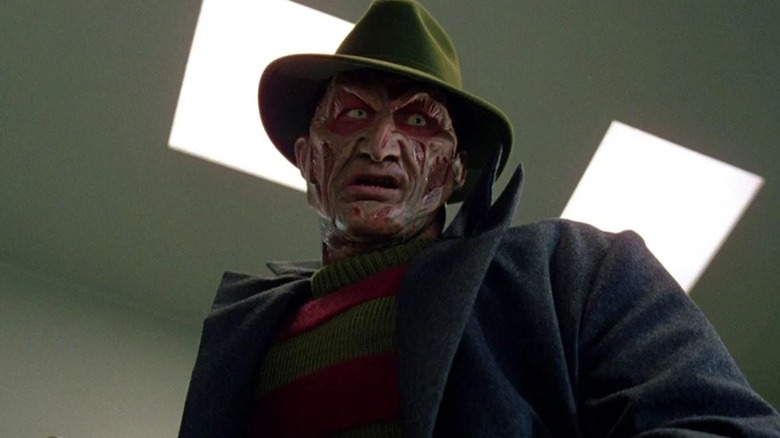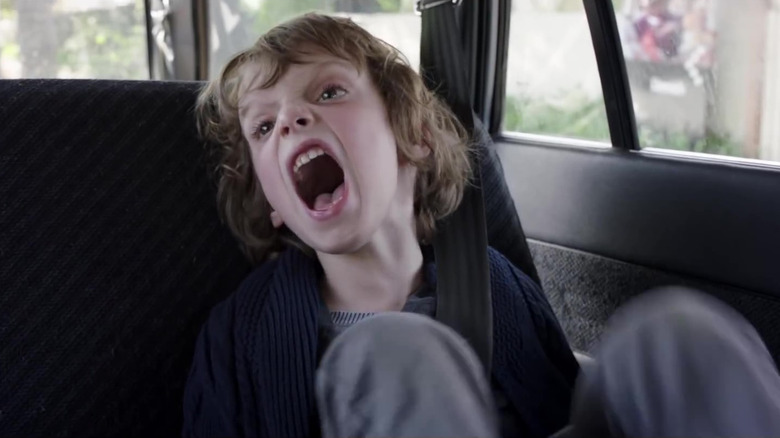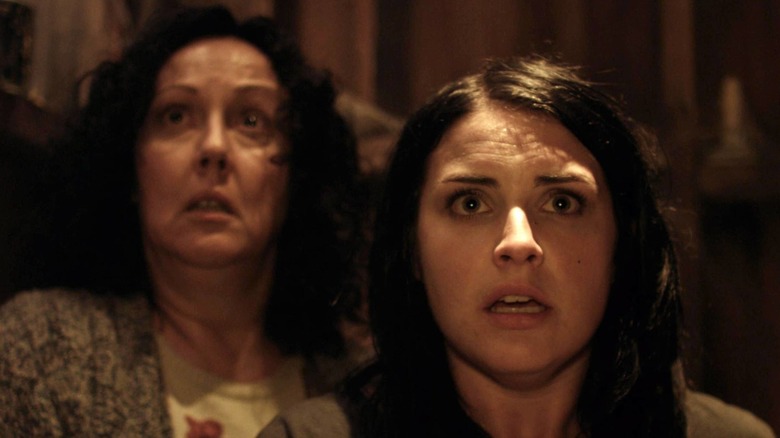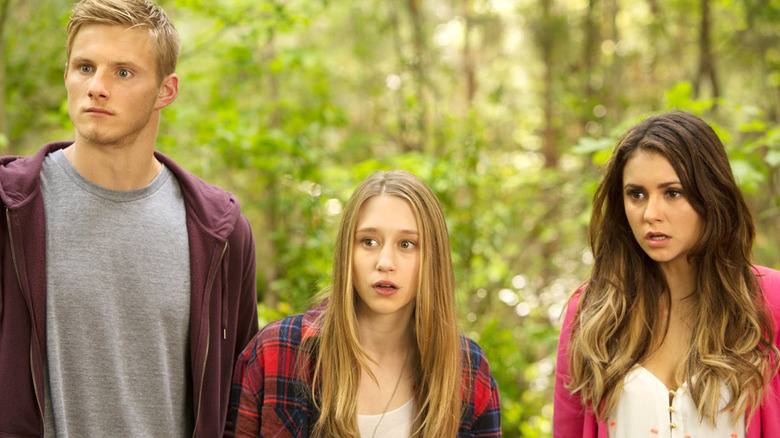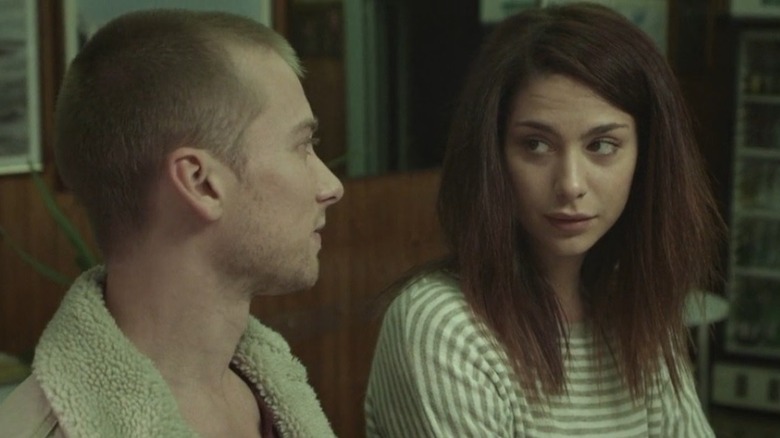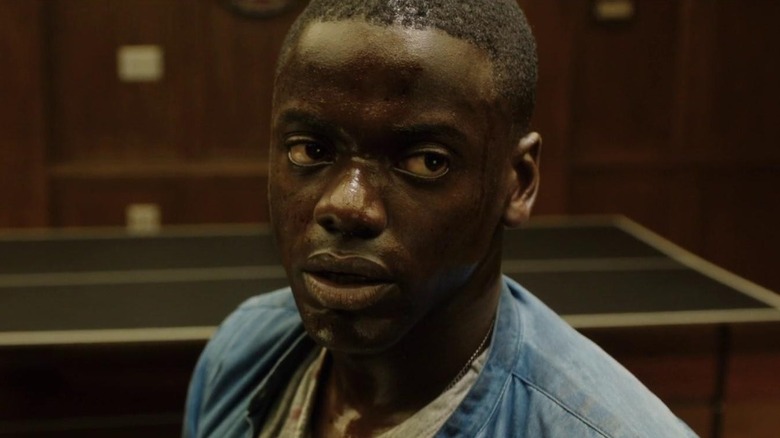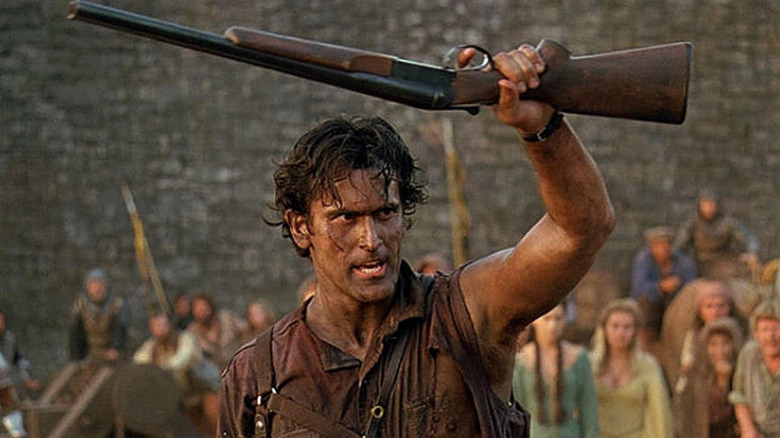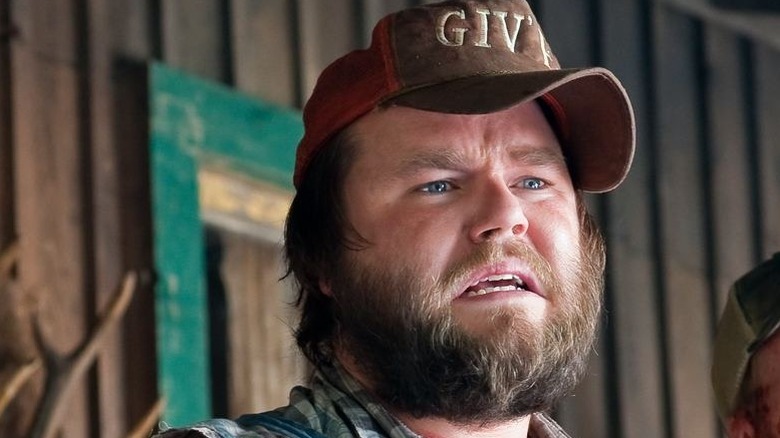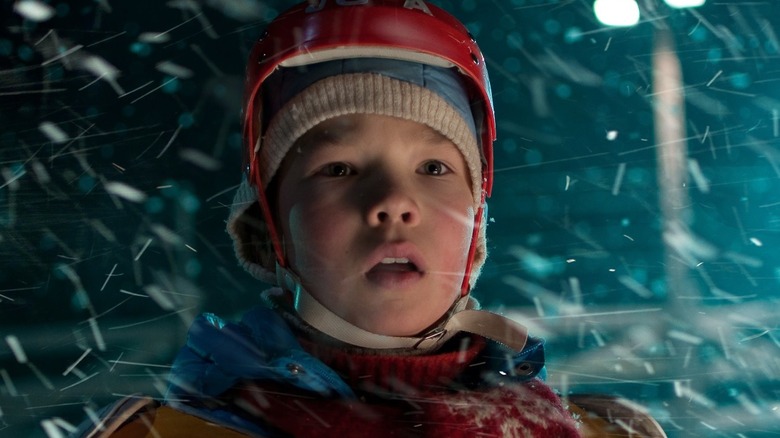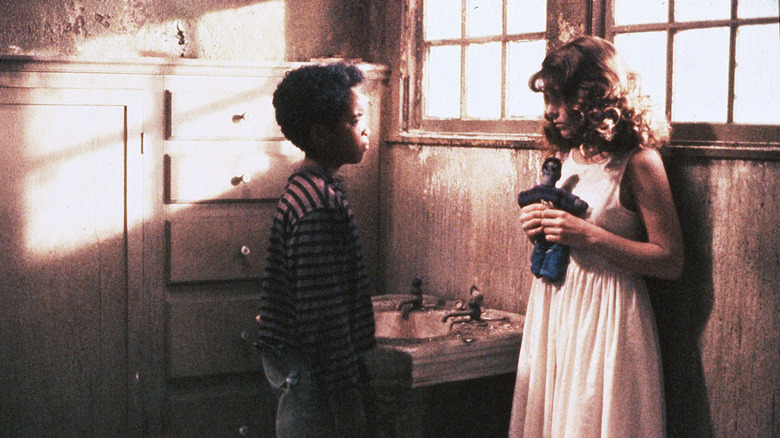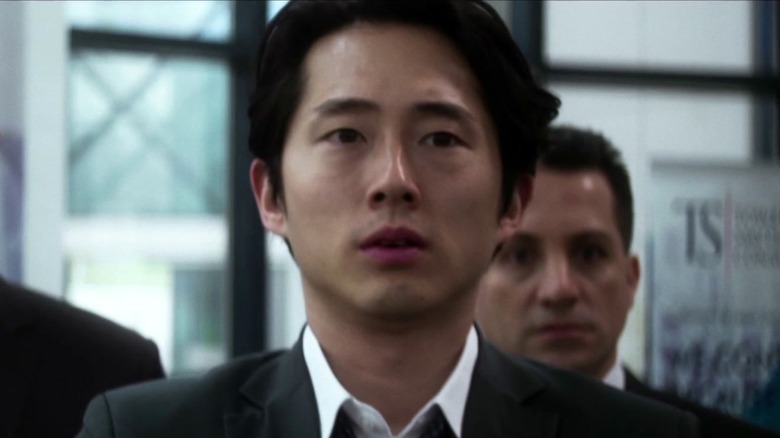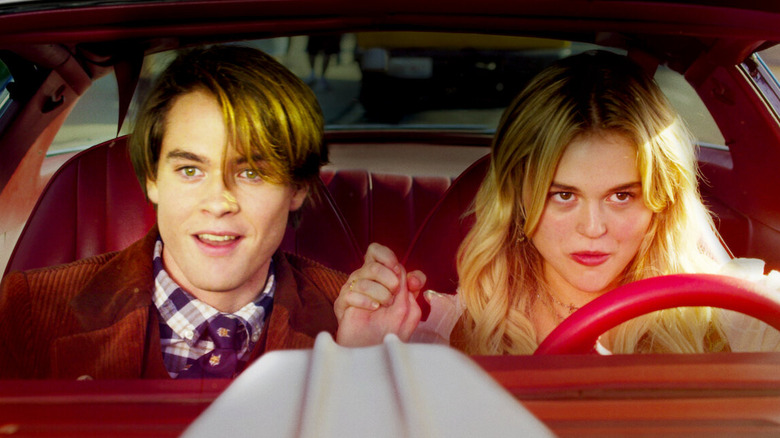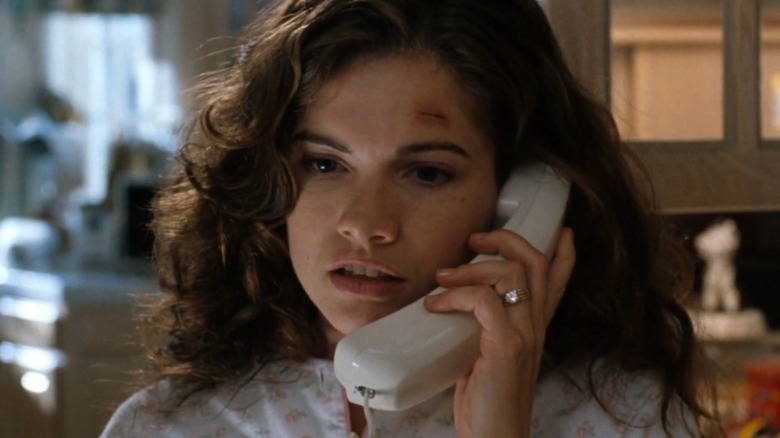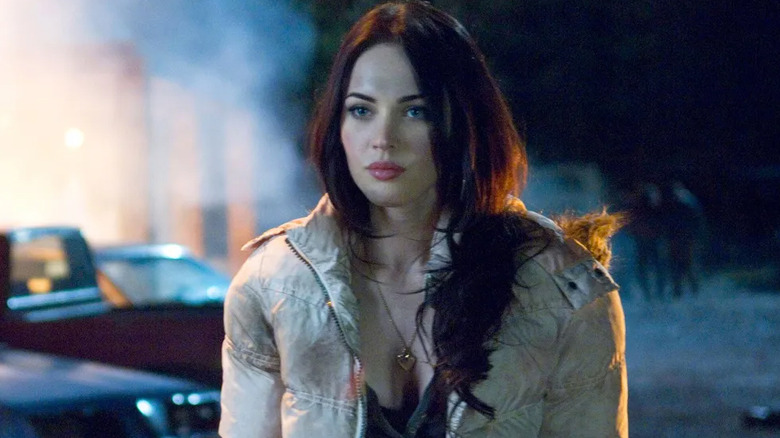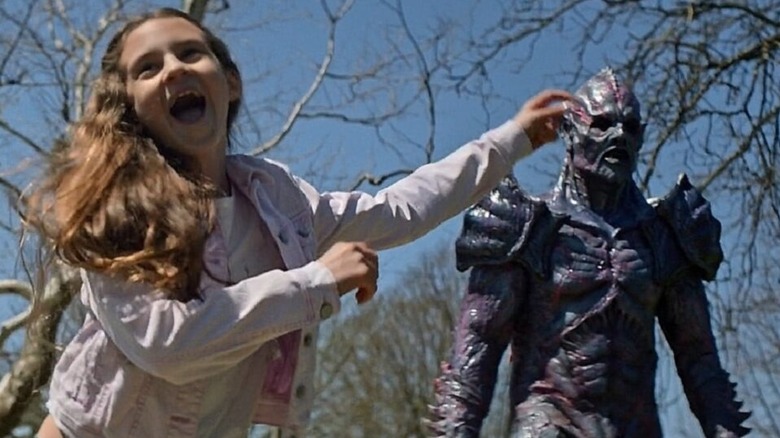Dark Horror Movies That Have Surprisingly Happy Endings
Dr. Coltan Scrivner has made an academic career based on investigating the links between morbid curiosity, horror fans, and mental health. As a behavioral scientist, Scrivner explores how the world of horror films contains essential tools to assist individuals struggling with anxiety disorders and fears of the unknown in their daily lives. While non-horror movie fans don't always understand the allure of watching dangerous threats targeting unsuspecting individuals, Scrivner's research has shed a light on its healing potential. Specifically, how it can aid anxious individuals in detangling the cognitive distortion that comes with "mistaking feelings for facts." Horror movies aren't real. While you may feel scared watching murderous monsters, horror films teach viewers how to endure and survive past fears.
Through watching a final girl persist through impossible scenarios, audiences can learn how to be their own Sidney Prescott. There's huge power in that theory. Despite what people might assume about horror, a wealth of films in the genre focus on empowering its cast of characters to survive. While it can be argued that most horror films — especially slashers — have happy endings, not all do. And, not everyone wants to sign up for a bloodbath that emotionally wrecks the viewer throughout and then ends on a world-shattering note like 2008's "Martyrs." Fear not! Below is a list of dark films that land a promising perspective.
The Babadook (2014)
Written and directed by Jennifer Kent, "The Babadook" takes the story of a mourning young son and weary mother to a monstrous level. Based on her 2005 short film "Monster," Kent crafts a haunting tale that explores the crushing toll of grief. In the 2014 movie, Amelia struggles to balance motherhood with her feelings about her husband's recent death. Her son Samuel's grief manifests as dogged temper tantrums that push his mother to the brink of her sanity.
Soon an entity known as The Babadook emerges, preying on them both. Kent's central monster in "The Babadook" is an apt metaphor for how grief feels: unwelcomed, unexpected, and tireless. But what is most memorable about this film is how it ultimately decides to tackle its enemy. Grief is no easy monster to defeat, and "The Babadook" beautifully showcases how to tend to it when it rears its ugly head into your home.
Housebound (2014)
2014's "Housebound" is one of horror's most charming films. Written, directed, and edited by Gerard Johnstone, "Housebound" still reigns as Certified Fresh on Rotten Tomatoes due to its unique ability to juggle several tonal shifts and dramatic plot turns. Johnstone's film works best the less the audience knows about its setup. Suffice to say, "Housebound" starts as a film about a wayward daughter named Kylie who ends up under house arrest with her estranged mother, Miriam.
What follows is a mixture of a ghost story, a murder mystery, and a comedic action-adventure film. Underneath its scary premise(s), "Housebound" investigates the dangers of assuming things about people. Through Kylie's judgemental eyes, the audience eventually sees the downside that comes with disregarding others. By its triumphant ending, "Housebound" showcases that people are more than they appear to be at first glance, and empathy ends up being the film's best secret weapon.
The Final Girls (2015)
Directed by Todd Strauss-Schulson, "The Final Girls" is another horror film on this list that tackles the irreverent power of grief. Unlike "The Babadook," this underrated slasher adds some much-needed levity to its dark premise. The 2015 horror comedy follows Max, a teenager still grieving the relatively recent loss of her single mother. On the anniversary of her mother's death, Max attends a horror movie screening for a film that her mother starred in 20 years earlier. Things quickly take an even darker turn. An accidental drop of a cigarette engulfs the movie house in flames, which magically transports Max and her group of friends into the fictional slasher flick they're watching. The group then has to attempt to survive the film, which brings in a slew of genre tropes to laugh at and cleverly subvert.
Despite the film's fun conceit, Max's journey is harrowing to watch. In a certain light, it's arguable that everyone is already dead in this film after the fire. Whether or not that's true isn't the point the movie is making. As the fictional film that the crew is in restarts again and again, and Max pushes through another slashing cycle, "The Final Girl" thoughtfully asks: "Is there ever a point that we truly get over losing someone?" Watching Max wrestle with the loss of her mom (and sole survivor guilt) is heartbreaking. But Strauss-Schulson ends the film in a gorgeously cathartic and healing way for Max's grieving journey.
Spring (2014)
From the trippy minds of beloved indie filmmaking duo Justin Benson and Aaron Moorhead, "Spring" puts a monstrous spin on a star-crossed romance. The 2014 horror mystery film follows Evan, a listless man who's adrift after watching his mother lose her long-term battle with cancer. He soon meets the mysterious Louise, who he can't help but fall head over heels for — even when she warns him that's a horrible idea. Despite some horror critics calling it an uninteresting mashup between "Before Sunrise" and "An American Werewolf in London," "Spring" delivers a solid story with a strong emotional hook.
The monster throughout the film represents a fear of vulnerability, metaphorically showing how difficult it is to let one's guard down to show one's true self to others. Benson and Moorhead deliver a hazy romantic tale that pushes its central characters to take a risk for love. Of course, taking that risk comes with (possibly) deadly costs, but the film instead chooses to illustrate how some things are worth going for, even if the stakes are horrifying. Sometimes love can save the day.
Get Out (2017)
For those who still haven't seen it, Jordan Peele's "Get Out" fantastically blends plot elements of "Guess Who's Coming to Dinner" with "The Stepford Wives" to create a chilling sci-fi horror film about racial inequity and white privilege. Peele's subject matter is harrowing, as he crafts a world in which the Armitage family has secretly created a new (and almost undetectable) way to enslave Black individuals. "Get Out" follows Chris as he navigates the uncomfortably tense experience of spending a weekend with his white girlfriend's family, who dole out as many backhanded compliments to him as racist microaggressions.
While the film's ending paves a way for Chris to ultimately win, Peele almost gave horror fans a different and bleaker ending. In 2018, "Get Out" producer Sean McKittrick explained to Vulture why the creative team's outlook on their original ending changed, stating, "We tested the movie with the original 'sad truth' ending where, when the cop shows up... Chris goes to jail... It was like we punched everybody in the gut. You could feel the air being sucked out of the room. The country was different. We weren't in the Obama era, we were in this new world where all the racism crept out from under the rocks again." To its credit, "Get Out" not only made Chris into a hero but a cultural representation of renewed hope in the ongoing battles Black individuals face every day in America.
Army of Darkness (1992)
Sam Raimi's "Army of Darkness" brought the unstoppable Ash Williams into the Middle Ages for his most successful adventure yet. Of course, Ash accidentally unleashes an undead army into medieval London first. But eventually, he defeats the Deadites and makes it back to his present time, regaling his coworkers at the S-Mart department store with stories of his Deadite-defeating adventures.
Filled with several memorable one-liners — including Bruce Campbell's iconic saying, "Hail to the king, baby!" — "Army of Darkness" reigns as a killer fun time. It's almost easy to forget that Ash is non-stop covered in gore, mud, and guts for the majority of its groovy runtime. Despite the odds stacked against him, Ash always perseveres through impossible challenges and does so with bumbling charm. Of all the movies on this list, "Army of Darkness" is one that reminds viewers to take some time for joyful moments, even if hordes of ravenous creatures are approaching.
Tucker and Dale vs Evil (2010)
Thanks to horror films like "The Hills Have Eyes," "Motel Hell," and "The Texas Chain Saw Massacre," murderous southern hillbillies have become a reliable staple for the horror genre. Unfortunately, this trope paints rural Americans in a very bloody light, often characterizing these individuals as dim, ignorant, and creepy. Even 2011's "The Cabin in the Woods" couldn't steer away from playing into this with its central villains, The Buckner Family.
Fortunately, 2010 gifted horror fans with the comedic gem that is "Tucker and Dale vs Evil." Directed by Eli Craig and co-written by Craig and Morgan Jurgenson, the horror-comedy subverts the audience's expectations of Dale and Tucker by showcasing them as empathetic, clever, and funny guys. However, the group of vacationing college students who arrive on the scene assume that the West Virginia-based duo must be evil. What follows is a comedy of errors that is a shockingly brutal and hysterical slasher. For once, rural southerners are the heroes in a horror film, nabbing all the best one-liners and getting a fair slice of action.
Rare Exports (2010)
Written and directed by Jalmari Helander, "Rare Exports" delivers frightening holiday folklore with a classic Amblin Films feel. Based on Helander's award-winning shorts, the 2010 feature film expands its take on Joulupukki, a terrifying Finnish Christmas character. "Rare Exports" follows a young boy named Pietari who lives near a research site that believes it has found Santa Claus' prison. In this film, Santa Claus is a nightmarish creature that likes to eat children, a fact that Pietari is very aware of throughout his adventure. His father Rauno, a reindeer slaughterer, is too concerned with saving his family from their impending bankruptcy than understanding what is bothering Pietari.
However, the father and son duo eventually team up to ensure Santa Claus doesn't escape, which causes feral elves — that look like naked and lanky elderly men — to attack them in revenge. Fair warning: There is a lot of male nudity bouncing around this bonkers film. However, by its end, Rauno and Pietari strengthen their bond. "Rare Exports" is a heck of a holiday horror film and one that proves that fears are easier to beat with a support system.
The People Under the Stairs (1991)
For OG "Twin Peaks" fans, seeing Wendy Robie and Everett McGill star alongside each other once more will be a dream come true. Like David Lynch's trippy and genre-blending television series, Wes Craven's "The People Under the Stairs" has a lot going on in its wily runtime. Despite being an R-rated film, the 1991 horror-comedy feels like a Disney Channel Original fever dream. Its central character is a young boy named Fool/Dexter, who goes against the killer odds of gentrification, white privilege, evil landlords, and eviction. (There's even a Scrooge McDuck-like vault of gold coins for Fool to discover.)
But upon closer look, "The People Under the Stairs" carries some disturbing side characters and kinks. Robie's Woman and McGill's Man are brother and sister, who sometimes call each other mom and baby or wife and husband. In their spare time, they kidnap children to raise. Once their kids start acting out, they mutilate them, trap them in the basement, and feed them human remains to stay alive. Robie and McGill go full camp with their performances, even if other stars approach their roles with determined sincerity. Craven holds nothing back when showing just how evil these white landlords are, making it easy to root for Fool's journey. At times, Craven's portrayal of Black poverty feels one-dimensional, but it's still rewarding to watch a young Black man save his community from homelessness.
Mayhem (2017)
Horror fans that loved "Ready or Not" will find a lot to admire in Joe Lynch's "Mayhem." Like Radio Silence's hit film, "Mayhem" is about class warfare. As a bonus, it also stars a fierce Samara Weaving in a movie that explores the abuse of capitalism in the workforce. The 2017 film follows Derek Cho, a rule-following and underpaid employee, on the day he's unfairly fired from his job at a law firm. However, on that same day, a deadly and aggressive virus outbreak occurs, forcing him and the entire building into immediate quarantine.
Derek soon discovers that the virus unleashes a person's rage, which inspires him to take his underdog fight to the top floor and battle the law firm's corrupt executives. While it's incredibly fun (and cathartic) to watch Derek find the justice he deserves, the film is also careful to show the flaws that come with climbing the corporate ladder. The office rampage isn't wholly mean-spirited, and it thoughtfully questions how much value society puts on work vs. workers. In the end, and after all the blood splatter, Derek finds a more sustainable approach to how he lives his life.
The Babysitter: Killer Queen (2020)
Before Jenna Ortega stole the heart of "Scream" franchise fans, she slayed in Netflix's "The Babysitter: Killer Queen." McG's sequel expands the first film's world by introducing Ortega's Phoebe, someone formerly babysat by Bee and who also holds a grudge against her. Although it's been two years since the insecure Cole defeated Bee's cult, he's still suffering from the trauma of that night. Sadly, no one believes what he endured as the bodies of the cult members were never found. Cue Phoebe's arrival. As Cole opens up to Phoebe, the pair learn there's still danger out to get them. The two team up to save themselves.
Similar to McG's "The Babysitter," this film dives head-first into its bloody action scenes. Half the fun of this entry is watching how creative the story gets with its kill set pieces. But it's also worth noting how charming the chemistry is between Judah Lewis' Cole and Ortega's Phoebe. While the first film hinted at Cole's budding sexuality, the sequel gives him a place to thoughtfully explore it and express his vulnerabilities, too — something not often seen in horror. "The Babysitter: Killer Queen" excels at forging into surprising territory, gifting horror with a memorable final boy whose strength lies in his empathy and gentleness.
Wes Craven's New Nightmare (1994)
Directed by the late horror master Wes Craven, "New Nightmare" has often been called his true meta-masterpiece, a more than fair claim to make. Craven's 1994 horror satire cleverly crafts a self-aware slasher that reflects on the legacy of the "A Nightmare on Elm Street" franchise. Robert Englund stars as himself and Freddy, while Heather Langenkamp portrays a version of herself who is tired of talking about her role in horror. Those choices alone bring plenty of thoughtful on-screen moments, but Craven takes it a step further by casting himself as Wes Craven in the film. The filmmaker speaks to the unexpected results of directing a film that turned into a horror franchise.
The Craven in the world of "New Nightmare" laments unleashing a character like Freddy, who in the course of the film has begun to come alive and taunt Heather. Watching the character of Heather struggle to watch as horror fans cheer Englund's Freddy on a talk show works on many levels. Despite Craven crafting his "A Nightmare on Elm Street" films around Nancy's survival, the franchise casted Freddy as its main and starring role. This film feels like Craven's bited response to the fact that Freddy gained more commercial mainstream acclaim than Heather ever did. Thankfully, "New Nightmare" brings Heather's Nancy and Heather herself into the spotlight, giving a final girl story that's uniquely powerful; Heather becomes more than the monster she's faced.
Jennifer's Body (2009)
In the words of Megan Fox, "Jennifer's Body" is "art," even if "critically everyone s— on it" when it initially came out. The A.V. Club wrote in 2009 that "Jennifer's Body" was "a showy piece of writing that doesn't have that all-important ballast of sincerity." The L.A. Times said it was "sorely lackluster." Some critics steamrolled into snide remarks about Fox with lines like, "The lead actress is... well, is Megan Fox." Writer Diablo Cody was criticized for simultaneously trying too hard to be cool but also not trying hard enough following her Oscar-winning success with "Juno." Other critics accused her of using Fox's "cleavage" to boost the film's image. Misogyny abounded. Not many then saw the charm of a woman friendship-focused story. Audiences didn't expect the revenge fantasy tale to be as brutal to men as it was nor did they appreciate a film led by a queer character and star.
Almost a decade after its initial release, "Jennifer's Body" is now widely regarded as a cult classic — even by the Criterion Collection's standards. "Jennifer's Body" rips its male characters to shreds for objectifying, over-simplifying, and abusing women. Jennifer's payback is gore-tastic. Amanda Seyfried co-stars in the film as Needy, a person who, by the end, also embraces the power of vengeance. For those craving a cathartic break from the white and cishet male outlook, "Jennifer's Body" will happily open its bloody arms to all.
Psycho Goreman (2020)
Technically, "Psycho Goreman" ends on a happy note. Honestly, whether or not the world survives the unending rage unleashed by an intergalactic warrior matters less than the romping good time that writer-director Steven Kostanski's tight 93-minute film brings. "Psycho Goreman" follows a precocious and rebellious young girl named Mimi. Through an odd turn of events, she discovers a gem that gives her control over a vengeful and blood-thirsty alien overlord whom she affectionately nicknames P.G. What works best about Kostanski's '80s-homaging monster flick is how it brings a gleeful joy to its premise while simultaneously delivering buckets — literally buckets — of blood splatter.
Throughout the course of the family-centered film, Mimi's control of P.G. evolves. Her ownership of him turns into an oddball friendship that teaches her a thing or two about trusting others and free will. Namely, Mimi realizes that bullies end up making their lives harder on themselves than need be. Expect a truly unique coming-of-age tale that doesn't shy away from showcasing some gory alien battles amongst its heartwarming storyline.
